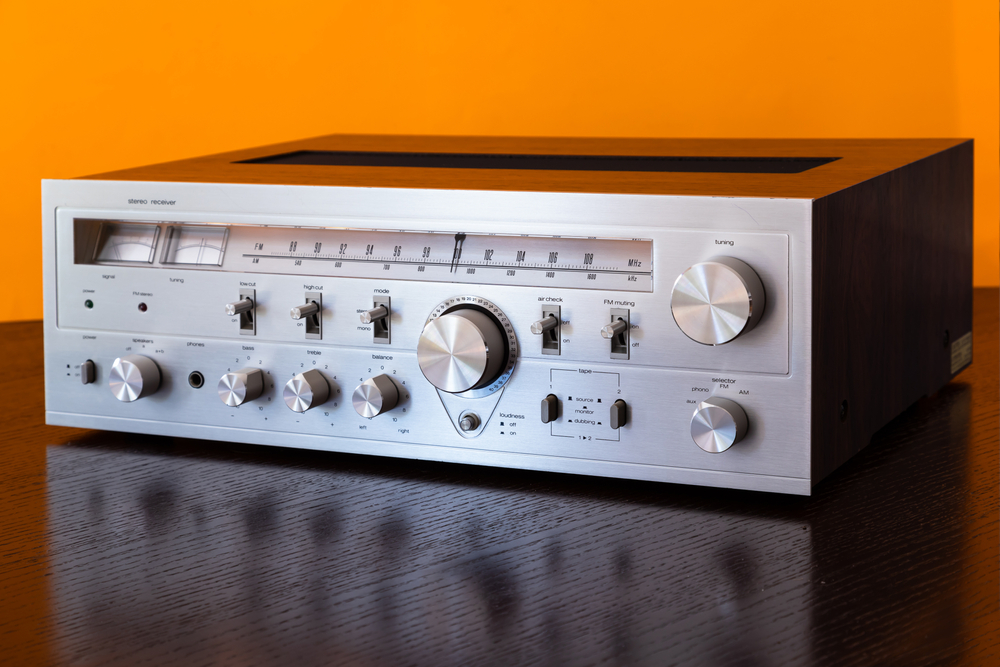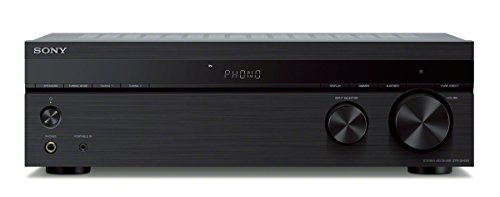The Best Stereo Receivers

While many home audio setups are geared towards surround-sound and multi-directional output, some of us still proudly cling to a simple, two-channel stereo configuration. With an emphasis on simplicity, a stereo system includes a left and a right speaker output to reproduce sound in the way it's typically recorded. If it's so simple though, what's with the stereo receiver? Why not just buy two speakers and be done with it? The thing is, not all speakers have their own built-in amplifiers, so they rely on a receiver to transmit and amplify the sound for them. If you're in need of a stereo receiver to amplify your system, we have you covered with this list of our favorite picks.
What to Look For
A good stereo receiver should be highly compatible, easy to use, and somewhat future-proof. Our roundup contains a variety of options ranging from affordable options like Pyle’s PTA66BT receiver to premium picks like Cambridge Audio’s AXR100. The former is a fantastic choice for anyone on a budget, while the latter is really designed to satisfy audiophile tastes. For an excellent middle-of-the-road option, look to Yamaha’s R-S202BL receiver, which is jam-packed with value and will be more than enough for most people’s needs. To learn more, keep on reading.
Sony STR-DH190
A stellar stereo
For both the modern music listener and the vinyl enthusiast alike, this option from Sony is a must-have. The STR-DH190 provides a preamp for giving those old records life again. And if you want to play music off of your phone, just connect seamlessly to the powerful Bluetooth signal. What a preamp essential does is take the audio signal that’s produced by the record player and transform it into a signal that the receiver can then can work with. Yes, there are other preamps out there, but they aren’t always a built-in part of an excellent stereo receiver. Essentially, the STR-DH190 offers a standard receiver with Bluetooth features and an excellent phono preamp.
Pros:
- This is ideal for casual music listeners who don’t need the bells and whistles of a more complicated unit.
- You can tweak the frequency settings (bass, treble) to your liking until the sound is just right for your tastes.
- It’s a great value for the price, especially considering the inclusion of a phono preamp.
Cons:
- As far as features go, this one is limited
Pyle PTA66BT Wireless Amplifier System
Ask and you shall receive
For those looking for a super versatile system, check out this pick from Pyle. You will likely use it first and foremost for its Bluetooth connectivity, which reaches as far as 40 feet. However, you can also play music through the auxiliary input, SD card reader, 1/4-inch microphone inputs, and even the USB input. Better yet, this receiver allows for up to six speakers, so it’s ideal for those looking to set up a stereoscopic sound system. Best of all, this adaptable stereo receiver comes at a bargain price point.
Pros:
- Unlike other receivers at this price point, this 600W machine is no slouch, so you can really crank it up.
- It includes a nifty remote control, so when the dance party is in full swing, you can bump up the volume from across the room.
Cons:
- The sound quality may diminish at very high volumes, but that’s true of virtually any receiver — especially at this price range.
Pyle Home PT270AIU
Plugged in
If you’re one of the many who prefer the old days of manual-plug MP3 players over the new wireless-everything paradigm, listen up. You haven’t been forgotten – not by Pyle, at least. In the PyleHome PT270 AIU, you’ll find a receiver that does something very simple: it allows you to play music directly from your old iPod by simply plugging it into the unit’s dock. From there, select the music you want to hear, press play, crank the volume, and relax. Is that so hard? That’s not to say that this one is a complete dinosaur, though. It has a few features that anyone can get behind, like AM/FM radio support, a bright fluorescent display, and SD memory and USB ports so you can import and play your songs that way.
Pros:
- This receiver also has mic inputs, so you can DJ your own shindig once it turns from a casual hangout to a late-night dance party.
- Aside from your two stereo speakers, you can also connect a subwoofer to it for some serious bass frequencies.
Cons:
- It doesn’t have the best hardware. For example, its buttons feel a bit cheap, which isn’t a big deal, but some people really love the tactile feel that high-quality hardware provides.
Yamaha R-S202BL
Gently down the stream
Long lauded for its superiority in the realm of audio electronics, this list wouldn’t be complete (or frankly, sane) without a Yamaha receiver on it. Lo and behold the R-S202BL, a trusty machine capable of filling your home with the most melodious of sounds. Whether y0u prefer listening to lo-fi scuzz or Mozart, pop your device into Bluetooth mode, sync up, press play, and the rest is history. The advanced circuitry and hardware integrity that are so commonly associated with Yamaha’s products are on full display here. The result is sonic subtlety capable of giving you the musical shivers.
Pros:
- Its brushed aluminum finish means that it isn’t just functional, it’s also decorative. This stylish receiver would add a dash of industrial pizazz to your apartment or home.
- This one is excellent for those lacking in technical know-how, as it’s easy to set up and a breeze to operate.
- It’s a great choice for older folks looking to upgrade an ancient stereo receiver to a newer, more functional one at a reasonable price.
Cons:
- The low end is a bit lacking, so if you’re looking for that deep sub-bass rumble, you might want to look elsewhere.
Cambridge Audio AXR100
The sound of luxury
If you’re looking for sheer power and hi-fi sound reproduction in one package, here it is. With the AXR100’s whopping 100W per channel, you can almost definitely push your speakers to the max without worrying about running out of headroom. What’s great about this unit’s output power is that you won’t have to worry about a smidgen of distortion. Instead, the receiver’s power will allow those speakers to focus on fidelity, and thus, they’ll be able to eke out sonic supremacy on par with angelic choirs. With four analog inputs, a subwoofer output, and a bunch of other input options, you won’t have to worry about device compatibility, either.
Pros:
- Despite its sophistication (or perhaps because of it), this one is very easy to set up.
- Besides being compatible with all standard-ohm speakers, it’s also compatible with the rarely seen four-ohm speaker configuration.
- It has a 3.5mm input jack, so if you’re not able to use Bluetooth, you’ll have an aux-input backup.
Cons:
- The fan is a bit noisy, but you’ll likely tune it out after you become accustomed to it.
Our Tips and Tricks
A stereo receiver can serve so many purposes in your home. Want to listen to the radio? Your stereo receiver of choice probably has an AM/FM tuner and antenna built-in. Hoping to play music directly from your electronic devices? Almost all stereo receivers have a 3.5mm jack that can plug right into your device. Some receivers even feature Bluetooth and WiFi connectivity, making wireless streaming a cinch. Want to use two stereo speakers to amplify your movie-watching or gaming experience? A stereo receiver will help you do it.
With the mainstream resurgence of vinyl records, many folks (especially young ones) find themselves uncertain how to play their records through speakers. Many stereo receivers have a built-in phono preamp, which amplifies the audio signal from your turntable and allows your speakers to play it loudly. If you plan on playing records, double-check to see if the receiver has a phono pre-amp.
Frequently Asked Questions
What is a 2.1 sound system? I see that everywhere and don’t know what it means.
Any time you’re looking at a sound system, the first number you see (in this case, “2”) represents the number of standard speakers the receiver supports. The number after the decimal (in this case, “1”) represents the number of subwoofers it supports. So a 2.1 sound system can be simultaneously connected to two standard speakers as well as a subwoofer. Not all stereo systems have subwoofer support, so if you do have a sub that you plan to use, it’s very important that you look for the “2.1” designation.
Can I use a more elaborate home theater receiver to drive my two-speaker system? Or does it have to be a designated stereo receiver?
You can certainly use other receivers to power your two-channel setup, as long as they have the proper inputs for your speakers. A 7.2 home theater receiver, for example, is compatible with up to 7 standard speakers and 2 subwoofers, but that doesn’t mean you need to use all of the inputs. In fact, the fewer speakers you use, the less you have to worry about the receiver’s power output being stretched too thin.
About the Author
Why Trust Us
With the constantly shifting landscape in the world of technology, GameRevolution seeks to provide gamers and tech-enthusiasts with the information they need to select the right products for their needs. Since 1996, our experts have used their knowledge on all the latest gadgets – everything from headphones to standing desks – to help millions of people navigate specs and answer common questions.






